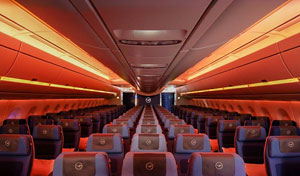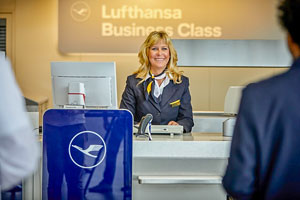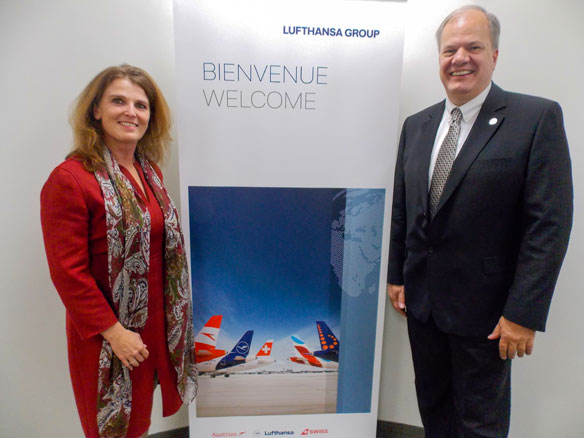
Lufthansa is committed to agents
BOB MOWAT
Canada, travel agents and a whole lot more were topics of the first of a two-part conversation when Canadian Travel Press sat down with the Lufthansa Group’s senior vice-president sales for Lufthansa Hub Airlines and chief commercial officer (CCO) Hub Frankfurt, Heike Birlenbach.
“The Canadian market belongs to one of the big markets for the Lufthansa Group,” Heike Birlenbach was quick to point out.
“It is very important and we are very happy that we have a long-lasting partnership here in Canada with Air Canada,” she noted.
Jointly, with Air Canada and United Airlines, Birlenbach told CTP: “We have about 30% market share across the Atlantic, and we’re getting even closer together now. We are now thinking about the next steps within this partnership. How do we make sure that we have an even better aligned offer for the customer.”
As for competition in Canada, she said: “We are always on our toes and in terms of what’s going on and the competition and especially here in Canada, we have witnessed quite some competition, also in the past years, also on low-cost, long-haul carriers, and I believe together with Air Canada we had quite a good response to competition.”
A little bit of friction
Birlenbach was also quick to make it clear that the Lufthansa Group’s relationship with agencies – consolidators, TMCs, small retailers, etc. – remains “of utmost importance to us as an airline.”
She explained: “We believe that the agencies are contact points and purchase points where our customers show up in order to purchase a ticket. And we believe we always need to be where the customer is. It’s not that we are forcing a customer in a certain direction – they decide – and we believe we need to follow.”
That said, Birlenbach also admits that there has been some friction between Lufthansa and the agency community, telling CTP: “There was friction, and, in some areas, there still might be some friction, that was caused by quite a disruptive approach by Lufthansa, questioning the status quo three years ago about the distribution capabilities and the next steps forward.”
“As you might remember,” she said, “we displayed our distribution strategy and that incorporated a full transparency about distribution partnerships, and we also introduced a fee for tickets that come through the traditional GDS channels versus non-GDS channels.”
“The aim here,” Birlenbach continued, “was really to make transparent what the cost of a certain channel is, but that was only the first step. We believe – and today we are even stronger in that belief, and now there is a lot of evidence that this is true – that in the travel industry, we need to make sure that in the distribution landscape we develop the capability to offer our products in an enhanced way.”
 More than A to B
More than A to B
For an airline, she noted, it’s not just about flying from point A to point B, it’s also about the features that belong to that product – like seat assignment, better legroom, speedy boarding, special meals, upgrades, etc.
“What we would like to do is really make sure that we are able to display the whole product range to our customers, no matter where these customers are. We’re not aiming to push them all through our own channels. We have our own channels, they’re really strong. They’ve developed over the last [few] years. However, we would like to have a collaboration with the ones [distribution channels] where customers purchase their tickets.”
Birlenbach told CTP that’s why the Lufthansa Group “entered the whole New Distribution Capability (NDC) landscape and we are pushing forward this standard and we built up or we offered possibilities to connect directly to our inventory and that caused some irritation with the agencies to question the status quo and question, until that time, basically the only channel, the GDSs.”
The difficulty with that, she said was “the GDSs were not capable of displaying all the product features, and we believe in the future that it is a key element that airlines are able to display the whole range of [their] products because otherwise, customers just compare a price of Lufthansa to a price of maybe a low-cost carrier. They don’t really see what is in, what is not in, what do we need to pay the extra for, and we would like to make sure that customers have full transparency about the rich content – that’s the next step.”
In fact, she pointed to other industries that are already capable of displaying the kind of rich content that she is talking about.
Pushing NDC
“Look at Amazon. When they display a product, what you see before you buy this product is quite inclusive. There’s a lot of content that they can display. We cannot do that via the classical channels today, and this is why we are pushing the New Distribution Capability (NDC) standard because that standard is capable of showing all the product features.”
Birlenbach said that because Lufthansa, SWISS and Austrian Airlines products offer more than just a seat going from A to B, “with our five-star approach, we believe it makes sense that we show the customer [all we offer] before [they] decide for product A or product B.”
With NDC now a topic of discussion around the world, she said that the Lufthansa Group is proud of the fact that it has been an industry leader on this new capability, and it is now talking to agencies around the world “explaining where we are heading to.”
“We would definitely like to head into the future together with the agencies and take along the whole community,” she said.
Today, Lufthansa has NDC start-up packages available for travel agencies, with Birlenbach telling CTP: “We support them [agencies] in technology enhancements. We even have NDC connections that are free of charge – it’s called SPRK, and nowadays, we can proudly say that we have about 2,000 agents connected, either via SPRK or by the NDC API powered by Farelogix.”
Exceeding the promise
Yet, while the Lufthansa Group has invested significantly in its own platform, allowing customers to come to it directly, Birlenbach admits that “there’s a big piece of business that is not going in via our own platform, especially in non-home markets.”
 She told CTP that: “Here we look for all the partners – and that could be all the kinds of different agencies, and I believe those agencies will have to make sure that they provide a value to the customer. And one customer is looking for convenience and maybe a cheap transaction, a fast transaction. Others are looking for more quality, and they would like to have a call centre to call 24/7 or whatever. So, they come up with different servicing offers to their customers and this is how they win them over. And, of course, we’d like to partner with all of those [agencies], as customers will buy in their shops.”
She told CTP that: “Here we look for all the partners – and that could be all the kinds of different agencies, and I believe those agencies will have to make sure that they provide a value to the customer. And one customer is looking for convenience and maybe a cheap transaction, a fast transaction. Others are looking for more quality, and they would like to have a call centre to call 24/7 or whatever. So, they come up with different servicing offers to their customers and this is how they win them over. And, of course, we’d like to partner with all of those [agencies], as customers will buy in their shops.”
The point, Birlenbach said is that: “The customer is the centre of our activities – they have to be in the centre of all our activities. We call it customer-centricity, but even human-centricity at times, and we need to make sure that our offer is relevant to the customer. This is how we can set ourselves apart from the competition. We have to make sure that the customer understands our product portfolio and what we offer and what we promise, and then, of course, we need to keep the promise or exceed the promise.”
Trouble, trouble
Asked about her concerns with the state of the world these days and the impact of some of the geopolitical changes and natural disasters that are taking place, Birlenbach told CTP: “Well, with the wide network that we have, we are basically always involved – no matter where in this world something is happening, there’s usually a connection to our business and it will affect our business.”
She continued: “There are quite a few geopolitical hiccups right now that do affect our business and that doesn’t necessarily mean that we immediately respond and pull our capacity out of a certain market or reduce it. There’s always an evaluation on whether that is a short term or longer term issue and then we decide on capacity adjustments.”
But she also pointed out that: “We believe in what we are doing. We provide mobility and, as Lufthansa, we are connecting the world, and we do rather like to make sure people are connected through us in a positive way. We’re supporters of globalization, but we are affected [by these geopolitical hiccups].”
Oil prices are another factor that are a concern, with Birlenbach telling CTP: “They go up and down depending on the messages that are sent in the market. There’s a lot speculation going on as well. Oil prices are one of the biggest cost factors for airlines – it has an immediate effect on us, as well as on other airlines. So, we just need to do our homework so that we are as efficient as possible and can walk through such a crisis if it occurs. Right now, there is no crisis. We have a very healthy environment. There’s lots of demand for travel – which is really good – and the worldwide marketplace is good for us right now.”
As for Brexit, Birlenbach said that: “We need to get prepared unfortunately. Being a global company – and looking for global markets and the connection of markets – we don’t like the idea of Brexit, The UK market is only 5% of our total business, so we are not too concerned about that.”
Overall, though, Birlenbach told CTP: “I’m optimistic about 2019. We have very different customer segments, and we believe that we are able to respond to customer needs already today and we invest heavily to also do so in the future.”
NEXT ISSUE: Birlenbach talks with CTP about the future and how she believes that a critical part of her job is “understanding today what’s going to happen tomorrow in our industry.”

